Post Eight - Gibraltar & Morocco
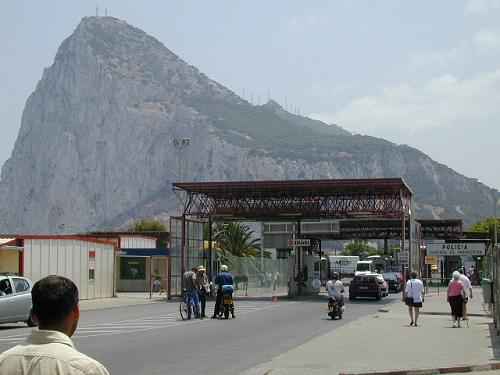 The Rock The RockMy first glimpse of the Rock of Gibraltar was a bit shocking, because I realized the silhouette was utterly familiar. The Prudential Insurance commercials of my childhood had long ago introduced me to its distinct outline. So that's what "Get a Piece of the Rock" referred to. At any rate, Gibraltar was a fun stop on the way to Morocco. A day was all we needed to cover everything: ride a cable car to the top, walk back down, hop the bus out to Gibraltar's southernmost tip for a view of Africa across the strait, stroll down the main streets, and indulge in a good pub meal. It was nice to eat a good curry and quaff a pint of English ale. -- Karen |
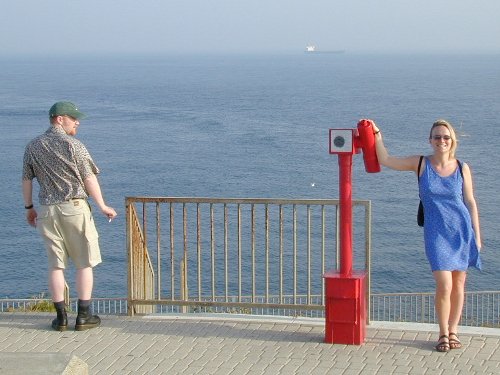 Edge of the Empire Edge of the EmpireGibraltar was a strange place. After being in Spain so long it was quite a surprise to suddenly be in Britain. We spoke English, paid for things with pounds, ate fish and chips and drank British ales. Because of the tax-free status, things like alcohol and tobacco were incredibly cheap. At one time, when the sun never set on the British Empire, there were outposts like this all over the world. Today they are relatively rare so I felt fortunate to be able to visit one before they are all gone. This is us at the southern tip of Gibraltar. If it were clear, northern Africa would be seen in the distance. Here Karen poses while Dave takes the opportunity to smoke a tax-free Camel Filter. -- Scott |
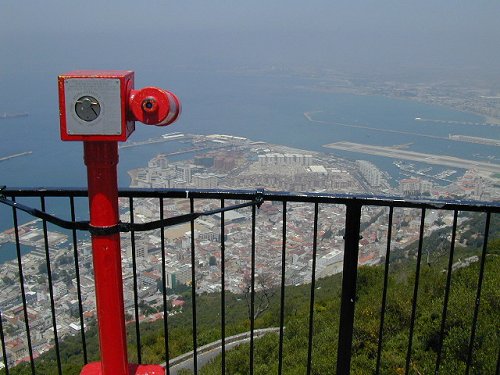 Gibraltar's Port Gibraltar's PortWe passed through the straits of Gibraltar while on board the Millenium, but the morning hour was too early for Scott and I to drag ourselves out of bed. So our first glimpse of Africa was Morocco's distant mountains from the top of The Rock. Gibraltar is a bit surreal. One moment you're in a Spanish port town with street signs in Spanish and Arabic, and then you cross through a gate and everything's in English. People even look more British here. I noted a much higher number of pink, sunburned pates and shoulders bobbing through the crowds than I had seen anywhere in Spain. -- Karen |
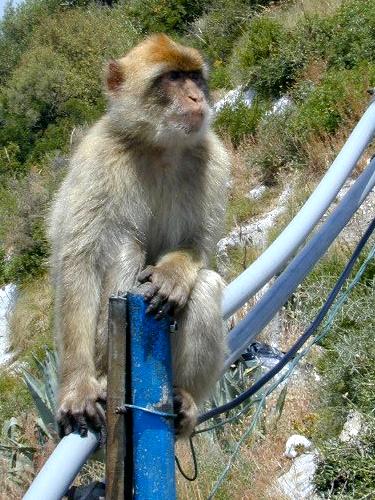 Gibraltar Monkeys Gibraltar MonkeysThe Gibraltar monkeys roam freely on the Rock, which is a wildlife refuge for them and various seabirds. British soldiers brought the monkeys to the outpost a couple hundred years ago from North Africa, and they've now become a pseudo-indigenous species. The monkeys have wise, noble air about them, as they sit perched on rocks, lie in the sun, or gently, protectively feed their babies. But many of them look pretty unhealthy, probably from eating bags of potato chips, raw pasta noodles, cookies, and candy proffered by tourists. The Gibraltar authorities feed them a "monkey diet" of raw vegetables and some starch, but otherwise don't do anything to protect the monkeys from the tourists, including leaving garbage everywhere on the Rock. Signs warn people not to feed the animals, but the pop cans, chip bags, and candy wrappers everywhere send another message. It's really too bad. They're aggressive about taking food even if you don't offer it, as Michelle found out the hard way. We sat down together on a bench, and out of the corner of my eye, I saw a quick movement behind her. A monkey had dashed over, grabbed cookies out of her bag, and scurried off with the booty with amazing speed. Once a safe distance away, it proceeded to screech a hair-raising warning at another monkey trying to share the spoils. The message was clear: "Don't even think about it." -- Karen |
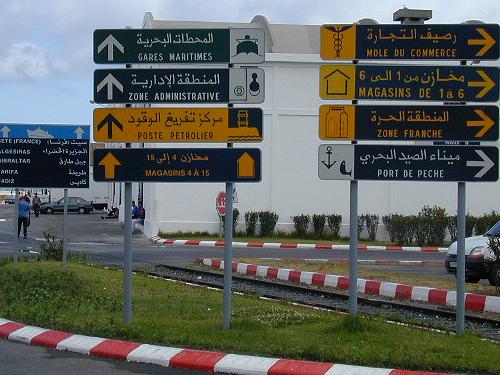 Welcome to Africa Welcome to Africa90 minutes after boarding a boat in Gibraltar, we were in Morocco. All our guidebooks warned us of the hassle and dangers that awaited us in the 'border town' of Tangier and as we stepped off the boat we looked at each other and said 'here goes'. This set of signs in French and Arabic was one of the first things we saw. -- Scott |
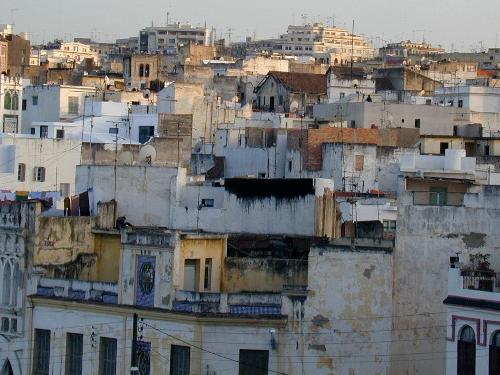 The Medina The MedinaContrary to what we had heard, Tangier was a fairly easygoing, friendly place. As we walked into the old walled part of town (called the Medina) to find our hotel, we immediately noticed the many minarets in town. It's from these towers that they issue the Islamic call to worship five times per day. The Medina is a maze of streets filled with people, shops, hustlers, and dazed tourists trying to look like they know where they are going. Our hotel was a beautiful relic from the past with rooms overlooking the harbor. The food there was some of the best food of our trip - couscous with chicken and spicy lentil soup. Unfortunately, there were no Moroccan wines on the menu to try. In fact, there was no alcohol at all since it's not allowed in the medina, and fairly rare in the country as a whole. Of course, we found a way around this... -- Scott |
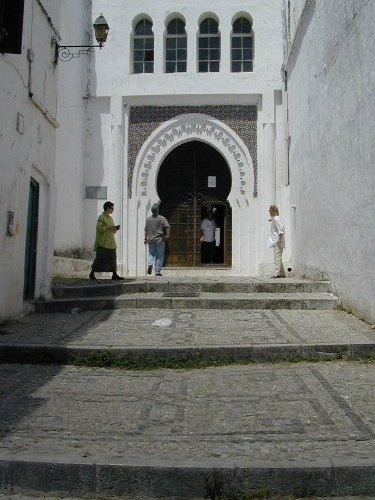 A Glimpse of Moslem Life A Glimpse of Moslem Life After tiring out the joke that we were headed to Morocco to "rock the Casbah" (my apologies to Clash fans), we finally made it to the real thing. This is one of the doors to Tangier's casbah, the Arabic word for palace. It was pretty deserted. I know too little about Islam, and I was extremely curious--and as a woman, a little bit nervous--to visit a city where its tenets shape daily life, especially in the medina, or ancient walled city where Tangier's first residents made their homes. The call to prayer was issued over loudspeakers five times a day. No alcohol was sold or served. And I paid extra attention to others of my sex. For an Islamic country, Morocco is said to be fairly progressive in its treatment of women. In the medina, women were usually clad in long-sleeved, floor-length, colorful robes called jalabas, with headscarves tied under the chin or draped over the face. Only a few women wore chadors, the head-to-toe black garb that fundamentalist Moslem women are required to wear in public. Outside the medina in the new part of the city, however, women often wore modern (very conservative) clothes and hairstyles. Outside of the markets and shops, female life appeared to exist only behind closed doors. In both the medina and the new town, women could not enter a tearoom or café; some patisseries and ice cream shops would serve them. Consuming alcohol in public was forbidden, though women tourists could drink in special tourist pubs or certain hotel bars. But I saw only the limitations. What liberties do Moslem women enjoy? My experience was short, but long enough to show me how sadly little I know about the Islamic world. The recent tragedies in the United States have only underscored that. -- Karen |
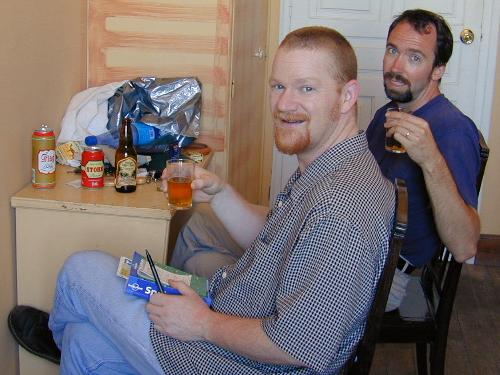 Moroccan Beer Moroccan BeerAlthough the Medina was alcohol-free, we were determined to try some Moroccan beer and wine. One night, Dave and I went out into the Medina, found our way through the streets to the modern city and eventually came upon a store where we could buy some local wine and beers. Back at the hotel, Karen and Michelle sipped the fairly decent wine while Dave and I did a formal beer tasting. The results? The Casablanca beer was ok, but the other two (Stork and Pils) were pretty bad. Although the beer was bad, Morocco as a whole was great and we vowed to return for further explorations. -- Scott |
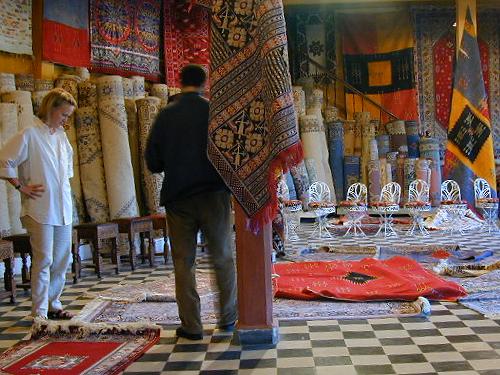 Aladdin's Den Aladdin's DenOur two-day trip to Morocco was what Scott and I called a "reconnaissance mission." We were scoping things out for a longer trip (which is now postponed indefinitely). The memory of our first dinner at the hotel is burned into my brain. I ordered a fabulous chicken tajine, made from half a chicken baked in a covered clay dish filled with lemon slices, green olives, and tarragon. I can close my eyes and smell the perfume of lemon rind, rich chicken aroma, and sharp olives, savor the tartness of the lemon, the briny richness of olives, the silkiness of the chicken, the bitterness of the thin shavings of rind. I also loved the gift shop attached to the hotel, which looked like an Aladdin's den of Moroccan arts and crafts, full with pottery, metalwork, clothing, weavings, jewelry, and of course, rugs. Down a curving staircase in the basement, a large, pillared room doubled as a storehouse and display room for carpets. They were folded and stacked as tall as me, rolled and leaned against the walls, hung from the ceilings in the center of the room and against the walls, and spread on the floors. Maybe someday we'll go back and buy a rug. This time around, though, nothing would have fit in the backpacks. -- Karen |
Post Eight Contents
Copyright 2001
Scott & Karen Semyan